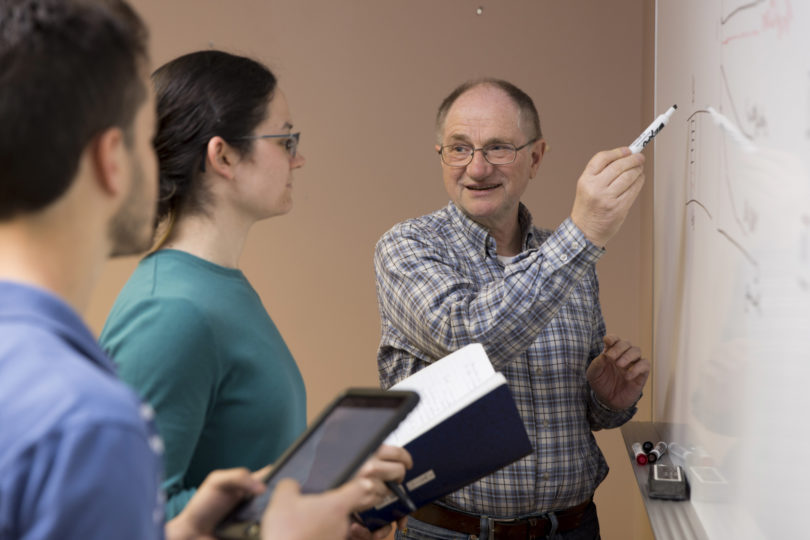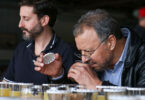If you buy meat or dairy products, there is a greater than 50 percent chance that the product comes from animals selected using genetic and computational methods pioneered by Ignacy Misztal, the D.W Brooks Distinguished Professor in the College of Agricultural and Environmental Sciences.
Where did you earn degrees and what are your current responsibilities at UGA?
I earned my master’s degree at Warsaw Technical University in Poland in 1978 and my doctorate at the Polish Academy of Sciences in 1985. I am now the D.W Brooks Distinguished Professor in the department of animal and dairy science in the College of Agricultural and Environmental Sciences.
When did you come to UGA and what brought you here?
I came to UGA in 1995 to take a faculty position and work with a team on issues in genetic evaluation, primarily in beef and swine.
What are your favorite courses and why?
I teach two graduate level courses. One is about statistical methods used for genetic evaluations of animals. The other one is on computing associated with the genetic evaluations, with an added focus of exploiting the genomic (DNA) information. I taught the second course as a short course in many countries on six continents as a recruitment tool for my lab.
What are some highlights of your career at UGA?
Highlights of my career include the implementations of methodologies for improving animal breeding and productivity at breed associations and commercial breeding companies. In addition to awards from scientific associations, industry groups and the College of Agricultural and Environmental Sciences, I am proud of the discovery and development of accurate, yet simpler and powerful, methods for genetic evaluation using genomic information—methods that were initially strongly criticized and are now becoming standard worldwide.
How do you describe the scope and impact of your research or scholarship to people outside of your field?
I tell them that when they buy meat or dairy products, there is a greater than 50 percent chance that the product comes from animals selected using our methods and our computing programs and that a fraction of their purchase indirectly goes to fund my lab.
How does your research or scholarship inspire your teaching, and vice versa?
Research makes everyone realize that theories are approximations of reality and details matter. This has impact on teaching that theories are presented critically, with discussions on which details matter, what is known to work well and what is in fact uncertain.
Teaching requires a pretty well-rounded coverage of topics more general than used in research. Real or potential questions from students force a more complete knowledge, and this can generate new research projects.
What do you hope students gain from their classroom experience with you?
Knowledge about the field and critical thinking.
Describe your ideal student.
Inquisitive, creative, persistent, optimistic.
Favorite place to be/thing to do on campus is…
I love to visit the Georgia Museum of Art or halls of the Lamar Dodd School of Art, just for inspiration. I also enjoy walking at the intramural fields and visiting the main library and North Campus.
Beyond the UGA campus, I like to…
Hike, including the Appalachian Trail, camp, ride a bike, especially in big cities, swim in open water, listen to a concert or opera, attend theatre performances. I am also an active ham radio operator (callsign NO9E).
Favorite book/movie (and why)?
My favorite books are “Guns, Germs, and Steel,” by Jared Diamond, and “Why Nations Fail,” by Daron Acemoglu and James A. Robinson. Both books help me understand the world better. I also like watching online courses at thegreatcourses.com. My favorites are on ancient civilizations, technology, religion and astronomy.
The one UGA experience I will always remember will be…
An end-of-semester reception at the art school, with dramatic art but sometimes ashamed parents and lots of food and drinks, followed by an exquisite opera performance next door.
Is there anything else you’d like to add?
A crucial issue to faculty, in my humble opinion, is avoiding overwork and allowing leisure time to let new ideas pop up. The best creativity occurs when we engage in light, unrelated activities, and overworking makes us managers, potentially critical of new ideas, which is contrary to what a faculty should be. I tell my graduate students to go to conferences a day earlier and not to rush coming back. This makes them not only happier but more productive, as they have time to rest, digest information, do better research and, in the end, save my time.
(Originally published Feb. 25, 2018.)





